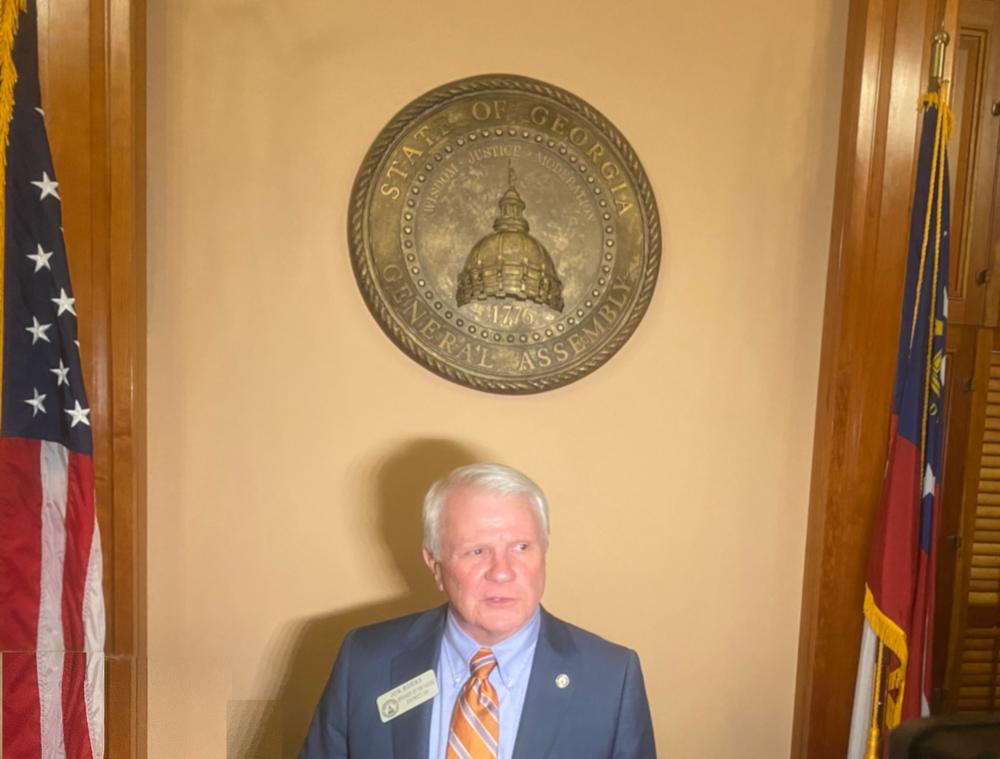
Section Branding
Header Content
Georgia Today: Historic theater is demolished, QR codes on ballots, hunting with impaired mobility
Primary Content
On the Thursday January 25th edition of Georgia Today: A historic African-American theatre in Valdosta has been demolished; Republican lawmakers push to remove QR codes from ballots; And the state attempts to make hunting more accessible to people with impaired mobility.

Peter Biello: Welcome to the Georgia Today podcast from GPB news. Today is Thursday, Jan. 25. I'm Peter Biello. On today's episode, a historic African-American theater in Valdosta has been demolished. Republican lawmakers pushed to remove QR codes from ballots, and the state attempts to make hunting more accessible to people with impaired mobility. These stories and more are coming up on this edition of Georgia Today.
Story 1:
Peter Biello: Republican state legislative leaders are pushing separate bills to remove QR codes from most of the state's ballots. The Senate Ethics Committee voted today to advance a bill that would require new scanners that would read printed text on ballots. Georgia Secretary of State Brad Raffensperger told lawmakers last week there's not enough time to shift away from QR codes this cycle. But the bill's sponsor, Sylvania state senator Republican Max Burns, says he'd love to see the change before November.
Max Burns: "That would be a difficult challenge. I defer to the Secretary of State on implementation issues, but my goal would certainly be to have it implemented as quickly as possible."
Peter Biello: Removing the codes is part of a continuing Republican push against Georgia's electronic voting machines. After the 2020 election, the machines became the subject of conspiracy theories alleging they were used to steal the election from Donald Trump. The bill goes to the full Senate for more debate.

Story 2:
Peter Biello: Georgia's top Republican lawmakers have provided further details on their plans for tax relief in the current legislative session. GPB's Sarah Kallis reports on the plan unveiled by House Speaker John Burns.
Sarah Kallis: Burns spoke about four bills that he says are aimed to help Georgia families. If they passed, parents would get an extra $1,000 per child in tax deductions. In homestead, exemptions would double. Another bill Burns highlighted would remove the cap on revenue shortfall reserves. He says the legislation would help mitigate the effects of inflation on Georgians.
John Burns: "But right now, there are no more important issues impacting Georgia families than higher prices."
Sarah Kallis: Burns also said legislation to reduce state income tax to 5.39% has been filed. Burns, Governor Kemp and Lieutenant Governor Bert Jones announced the income tax reduction before the session. For GPB news, I'm Sarah Kallis in Atlanta.
Peter Biello: For all the latest news on happenings under the Gold Dome. Tune in to lawmakers at 7:00 in the evening on GPB TV, and you can stream it at GPB.org.

Story 3:
Peter Biello: Some local residents are protesting plans for a monkey breeding facility in southwest Georgia. A company called Safer Human Medicine wants to build a nearly $400 million complex in Bainbridge to hold up to 30,000 monkeys to be sold for medical research. Resident Kristina Martin says she's worried about potential health and environmental effects.
Kristina Martin: "You don't have the diseases, the types of diseases that you do with chickens like you do monkeys, and you also have airborne pathogens, that can be carried from the monkeys. You've got insects that can carry diseases from the monkeys all over. You've got wildlife that can, you know, that can get near the facility. I mean, it has a huge impact environmentally. There's the amount of waste for that many monkeys. I mean, it's something like 444,000 gallons per day. Where do you think that's going?"
Peter Biello: Company and local officials say community concerns are baseless. The company touts the project's 263 potential jobs. Opponents say they're considering legal action to stop the facility tax breaks for which local officials quickly approved last week.
Peter Biello: Building on efforts to address mental health care disparities. Advocates laid out their legislative priorities at the state Capitol this week. GPB's Sofi Gratas has more on how they're hoping to engage lawmakers.
Story 4:
Sofi Gratas: Georgia ranks low on the list for access to mental health care, but follow up to the mental health parity bill never got bipartisan support last year. So advocates this year are lobbying for smaller, more focused bills to put naloxone, an opioid overdose reversal drug, in every state building and to better regulate recovery organizations. Roland Beam, with the Georgia mental Health Policy Partnership, says it's also key to legislate insurers since lots of mental health still goes on covered.
Roland Beam: "We have providers. What we don't have is insurers who are willing to work to ensure that they have adequate networks of those providers."
Sofi Gratas: So far, agency budgets target behavioral health worker salaries and adding more beds for psychiatric treatment. For GPB news, I'm Sofi Gratas.
Story 5:
Peter Biello: The chief judge of Albany's Dougherty Judicial Circuit has announced that he will not seek an eighth four year term in the upcoming general election. Chief Judge Willie Lockett in 1996, became the first African American since reconstruction to win a contested countywide election in Dougherty County. In a statement yesterday, Lockett says he intends to serve as a senior judge when needed.
Story 6:
Peter Biello: The city of Valdosta has demolished a historic theater that entertained the city's African-American residents for decades during segregation. The 1935 Liberty Club hosted luminaries such as Ella Fitzgerald, Earl Hines, and others. It eventually fell into disrepair, and after many legal and financial issues, the city issued a demolition order last year. The building was torn down yesterday. A statement from the Valdosta Heritage Foundation expressed disappointment that the city and the nonprofit group that owns the building, could not reach an agreement to preserve it.

Story 7:
Peter Biello: For the some 14% of Georgians with impaired mobility, enjoying outdoor recreation can be a challenge. That's why every year, Georgia's Department of Natural Resources hosts what they call an adaptive hunt. It's part of the agency's mission to make things like hunting, fishing and archery more accessible than the state's parks and wild spaces. GPB's Sofi Gratas has filed this audio postcard. And just a note, this piece does include the sound of a rifle firing.
Max Richardson: "Ready? I feel ready. A little nervous. I've been shooting for a while, probably since I was like 5 or 6, but never pulled the trigger by myself So with that guy from North Dakota who sent the trigger to us, it was a great first time experience. Being able do like the whole process by myself. My name is Max Richardson. I'm 17."
Mitch Richardson: "My name is Mitch Richardson, and I'm 49 years old. I'm Max's father. He was disabled at birth. Um, but growing up, he's been able to join his track team at school at Calhoun High School. He, uh, he participates with the football team, helps the coaches. But hunting, uh, has always been limited. Uh, he's just always needed my help. "
Ken Madren: "And what are y'all hunting today?"
Max Richardson: "Uh, whitetail."
Chip Madren: "All right. Yes. Hi. I'm, uh, Chip Madren uh, from Atlanta, but now we live out here in Mansfield, Georgia. Uh, I've been shooting since I was five, six year old. My dreams I've realized is to help make Georgia uh, lead the pack in outdoor accessibility experiences."
Ken Madren: "I think it's Chip's passion. And I just don't think I could be more proud. Chip is my son. Um. Um. I'm Chip's father. Uh, we, uh, been in the woods together for a long time. Um, cancer threatened that, along with other things. Chip has particularly low vision, but he's working with the Department of Natural Resources, trying to facilitate outdoor experiences for other Georgians. And what we find is there's a volunteer spirit. There's so many people that want to help facilitate. And if there's a will, there's there's a way. There really is. "
Kim Morris Zarneke: "I told everybody the sun was coming out. I am Kim Morris Zarneke and I am the program manager at the Charlie Elliott Wildlife Center, which is part of the Wildlife Resource Division of Georgia DNR. So this year's our third time offering this particular hunt."
Kim Morris Zarneke: "Well, we have one gentleman who's an amputee. We have another gentleman who had a stroke that has left his whole right side paralyzed. Um, we have another gentleman who had an accident who is now quadriplegic. So and we had another one who had a similar farming accident who left him is a paraplegic. So they're things that have happened to them in life that has led them to this point. And so we're trying to create those opportunities that they can go back and enjoy some of the same hobbies they had before. And one of the pieces of that is our action track chair, which is a tool we use to get people into the woods. Is it the first time in the chair?"
Max Richardson: "Yeah."
Kim Morris Zarneke: "What do you think of it?"
Max Richardson: "It’s got a whole lot more power than my other one. With the new action chair. It's like you can get more places even then. Like what your previous chair has been able to go is just more capable of certain things. Instead of, like, wheels. It's like a track. Like, what do you see on a tank."
Kim Morris-Zarneke: "As we build out our program, we're looking at tools and resources we can build into our program. And that was one that made it high on the list. So it's all about making the tools and resources available, because a lot of people just assume hunting is only available for able bodied people. And it's not true."
Peter Biello: You just heard from Max and Mitch Richardson, Kim Morris-Zarneke and Chip and Ken Madren. And those action track chairs for people with mobility impairments are available at 11 Georgia state parks through the organization All Terrain Georgia.
Story 8:
Peter Biello: In sports, the Atlanta Vibe, the city's newest professional sports team, won the very first match in Pro Volleyball Federation history yesterday. The PVF is one of three women's professional leagues operating or planned for players who previously had no choice but to go overseas to continue their careers. Atlanta continues their season opening road trip Friday in Orlando against the Valkyries. The vibes first home game is one week from today at Gas South Arena in Duluth, where they'll play the San Diego Mojo. The Philadelphia Phillies have signed Braves pitcher Colby Allard. The Phillies signed a lefty to a one year contract. Allard pitched just four games for the Braves last season, and Jim Harbaugh, who was interviewed for the open head coach position with the Atlanta Falcons, has been hired as head coach of the Los Angeles Chargers. He leaves Michigan after helping the team win its first national championship since 1997. The search for a new coach for the Falcons continues.
Story 9:
Peter Biello: And local baseball players and a slew of extras have a unique opportunity to share some of the spotlight with sports professionals on the opening weekend of Major League Baseball. A casting director is looking for players aged 20 to 35 with a quote unquote vintage appearance to act in a General Electric commercial being filmed at historic Luther Williams Field in Macon during the overnight hours of February 7th. Those cast as principals should expect to be paid $600. Extras will be paid $175.

Story 10:
Peter Biello: Think you can make a mean rack of ribs or the tastiest barbecue chicken? The School Resource Officer Smokehouse in Rome will host the first cooking competition as part of its cooking for a cause campaign next month. The competition will benefit the School Resource Officer Scholarship Fund. It's open to the public and will be held at Model High School in Rome on February 11th. The School Resource Officer Smokehouse is a group of local school resource officers who hold fundraising events selling smoked meats and plates of food at the various high schools in Floyd County. The SRO Scholarship Fund provides senior high school students in need with financial support to pursue their education.
Peter Biello: And that is it for this edition of Georgia Today. Thank you so much for tuning in. If you want to learn more about any of these stories, visit GPB.org/news. And if you haven't yet subscribed to this podcast, take a moment and do it now. Back in your podcast feed tomorrow and if you've got feedback, hit us up. The best way to do that is by email. The address is GeorgiaToday@GPB .org. I'm Peter Biello. Thanks again for listening. We'll see you tomorrow.
---
For more on these stories and more, go to GPB.org/news



